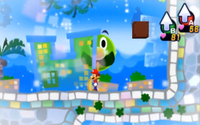Luiginary Speedometer
The Luiginary Speedometer[1] is the fifth Luiginary Work seen in Mario & Luigi: Dream Team. It allows Dreamy Luigi to speed up or slow down Mario's movements.
Luiginary Speedometer resembles a floating grandfather clock, with a pendulum swinging from it. It floats in the background, and follows Mario and Dreamy Luigi once found. While possessing it, Dreamy Luigi's mustache becomes the clock's hands. Dreamy Luigi can jump while inside Luiginary Speedometer.
While this work is inhabited by Dreamy Luigi, the real Luigi rocks back and forth. Icons for a menu player are displayed over Luigi's nose and mustache, a step forward icon on the left hairs, a fast forward icon on the right hairs, and a pause icon over the nose. When Starlow interacts with Luigi, it changes the effect of Luiginary Speedometer. Pulling on the left side of the mustache slows down Mario, pulling on the right speeds him up, and pushing the nose reverts things to normal. Luigi's rocking slows down and speeds up based on the setting, as does the music.
Speeding up Mario allows him to run against the direction of Conveyor Belts. It also increases his jumping speed, noticeably making Mario fall down much faster. Slowing down Mario lets him jump higher and farther, and his descent is slowed down.
While speeding up Mario, the right side of Dreamy Luigi's mustache becomes an arrow pointing to the right. The pendulum's speed is equally affected by the speed set by Luiginary Speedometer.
This Luiginary Work is used in many timer challenges in which Mario must hit an ! Block within a certain amount of time.
Locations[edit]
- Dreamy Wakeport (Thunder Sass and Heavy Zest areas)
- Dreamy Somnom Woods
- Dreamy Neo Bowser Castle (Area B)
